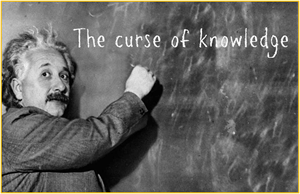“Gliding,” my dad says. He pauses.“Gliding,” he repeats more emphatically.
My sister and I stare at him, confused. He waits another beat.
“Gliding down the pavement…Gliding”
“We get it! Gliding!” I spit. He shakes his head and throws his hands in the air, exasperated.
“Gliding,” he says again, grimacing, hating himself for having no other options, letting it hang in the living room air. “Gliding on the pavement.”
And then the timer is up and so is our round of Taboo, the guessing game where you try to get your team to say a word on a card, and you can’t use the five given words on the card as clues. In my dad’s case, the word was “Rollerblading.”What’s going on here? Why do people give the same clues over and over, even though they don’t get you anywhere? Why, in Pictionary, do people continue to redraw the same clue again and again, darkening and thickening the lines of a simple figure, when the guessers didn’t get it the first time? Why, when students don’t understand what the teacher is explaining, the teacher just gives the same explanation, but slower?
I found the answer in a book I read recently. At the suggestion of my friend and mentor, Steven Tomlinson, I picked up a copy of Made to Stick by Chip and Dan Heath. It’s a great book about how to make ideas “sticky:” how to communicate ideas so they are easy to grasp and stay with you. It’s very relevant for anyone who teaches, or you know, wants to communicate ideas.
One of the obstacles to clear communication is something called The Curse of Knowledge. It’s the idea that when you know a lot about something, it’s almost impossible to understand what it’s like not to know it. Once you are a master, it’s hard to remember what it was like in the beginner’s mind. Like it’s hard to imagine a time before seatbelts. Those people must have been morons, right? No, actually they are just as smart as we are, seatbelts just hadn’t been invented yet. Hard to comprehend, people just hopping in those cars, riding around town with the kids sliding around the back seat of the station wagon. What once might have seemed confusing (you want to strap me to this throttling hunk of steel?) now seems totally obvious.
You can see how this makes a problem for teachers. The people best equipped with knowledge can be the worst people to communicate it! They may be explaining details when they skipped the fundamentals. They may going in to examples before giving an overall view. They may start so basically that even the beginner already knows what they are saying. But it’s difficult for the teacher to really grasp what the student knows and doesn’t know.
The compelling example they use in the book is the Tapping Game. We played this at the last Known Wizards rehearsal, and it’s a good little icebreaker activity. One person is secretly given a popular tune. They tap the beat of the tune on the table, hoping the group will guess it.
This party game was actually a part of a psychological study exploring the Curse of Knowledge. Tappers on average estimated that 50% of listeners would identify the specific tune; in reality only 2.5% of listeners could identify the song. It seems easy but it’s nearly impossible to do successfully. Why such a discrepancy between the experience of the “expert” and the “novice?” Well, in the tappers head, the full song is playing loud and clear. They hear the guitar and piano, the lyricist and the drums. The listener just hears the taps. They hear the empty space and the seemingly arbitrary taps. The tapper has the curse of knowledge–they can hear so much inside their heads that they can’t tell how little information they are actually communicating to their guessers.
For me, having done improv for 20 years, it can sometimes be a challenge to imagine what it’s like for beginners. What is it like to hear the instructions for Whoosh Bang Pow for the first time? How odd and random it must be! “Now Whoosh to either side, Pow across the circle, Bang is a reverse.” What? The students must feel so unsure and uncomfortable.
And we tend to structure our lives to have as few beginner experiences as possible. Because it can be uncomfortable, we’ve created our world around our competencies, leaving few challenges. My friend Nathan, who spent six months travelling around the world, said the most remarkable revelation he got from his trip was his incompetence. He is a high achieving writer and manager fluent in English, German, and French. But on a bus in Bolivia, that doesn’t help you that much. Dropped in a new context, he was a true novice again. He realized he shaped his environment to play to his strengths (a great idea, by the way,) but lost sense of his limitations because of it.
I can empathize with the beginner experience during the times I am feeling out of my depth or trying something new. For example, I’ve been experimenting with leading improv workshops in a webinar format. And although I’ve been assured how simple conducting an e-learning seminar is, I nearly had a panic attack when I tried to do a trial run with my mom the night before my pilot program and she couldn’t hear a thing I said, much less participate in my webinar.
Doing a workshop I’ve done hundreds of times in a new setting pushed many buttons for me. In my pilot with my client, I went too fast, missed simple offers, made several technical blunders, and, in 60 minutes, made it out alive. I learned so much, and that was the only way I could do it. In theater we call it a stumble-through. It’s the rehearsal where you put down your script, even though you’re not ready, and put the show on its feet. You get through it, perhaps a little dinged up, but now you know what you need to work on.
So even though I can’t play Whoosh Bang Pow again for the first time, I can still have new experiences and feel like a beginner again. I can gain empathy for my students. I can try several ways of explaining things. I can also know that playing the game is the best teacher at all. Lots of times it’s best to stop explaining and start playing and the activity will teach you everything you need to know. To paraphrase Keith Johnstone, bicycles are great teachers—they give you instantaneous, clear feedback about whether you are riding them properly.
Is there something in your life that you have the Curse of Knowledge about? Something you feel other people find difficult to understand when you explain it to them? Cooking? Your filing system? How to use the remote? On the flip side, have you had the experience of being a beginner lately? Tried anything new? An improv class, perhaps?
Founder, Merlin Works


